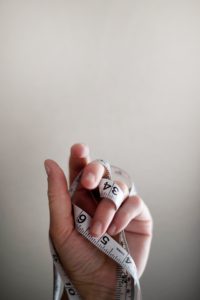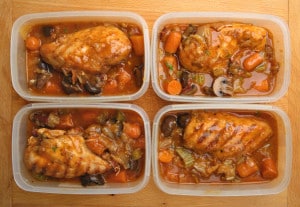Celiac Disease and Weight Gain

At a Glance:
- Celiac and weight gain are not words most people like to hear. The good news is you’re not alone. There are many other people out there that experience the same thing.
- It is possible to have celiac disease and live a healthy lifestyle. Grocery shopping has become much easier these days.
- There are so many hidden sources of gluten found in products. The tiniest amount can contribute to bloating and weight gain.
Most people who have celiac disease can still suffer from weight gain. This can be for a number of reasons depending on the person and the individual situation.
Is it Common for People with Celiac Disease to Gain Weight?
When first diagnosed with celiac disease, many people concentrate on researching gluten-free food. But what is often forgotten is the calorie intake.
Once you adopt a gluten-free diet, and stick to that lifestyle, the damaged villi in your small intestine finally have time to heal. This means that your body can begin efficiently absorbing nutrients from the food which may contribute to initial weight gain. But the question is:
Are you eating the right foods?

Although many social media celebrities would have you believe that going gluten-free is the best way to shed the pounds, gaining weight is still possible when changing to a gluten-free diet.
The main reason for this (that many people don’t tend to realize) is because once you start eating a gluten free diet, your body is able to heal and start processing nutrients efficiently.
Therefore, fat-filled, store bought junk food options are easily processed by the body.
It is key to remember that despite the absence of gluten, processed food is always processed food.
That is why many people find themselves gaining weight even after switching to a gluten-free diet because they fill their grocery lists with gluten-free cookies and bread.
The best way to manage celiac disease without piling on the pounds is by filling your diet with naturally gluten-free whole foods like organic meat and poultry and fresh fruits and vegetables.
A great option is to follow a paleo eating plan, which cuts out processed foods and grains entirely.
Is There a Way I Can Still Be Consuming Gluten Even Though I Have Cut it Out of My Diet?
When you have celiac disease, your body can react to the smallest amount of gluten. This can also be a reason for weight gain or bloating.
There are many items available on the market that contain traces of gluten that not everyone is aware of including:
- All processed meats
- Soups and stock
- Wheat free rye bread
- Salad dressing
- Marinades, gravies and sauces including soya
- Vegetarian meat alternatives such as veggie burgers
- Chewing gum
- Restaurant meals both when eating in or taking out
But it’s not just food!
But many things you can find around the home may have traces of gluten. Such as:
- Beauty products
- Pet products
- Cleaning products
- Laundry products
- Alcohol
It’s only natural for people who have celiac to look at their food choices. But what many forget is how many calories they are consuming.
When you have been diagnosed with the celiac disease, digesting gluten becomes a problem. Gluten is a natural protein found in wheat, barley, rye and some other protein based foods. When eating and drinking anything with gluten, the lining of the small intestines becomes inflamed and damaged.
With celiac disease, weight gain is still possible on a gluten-free diet. One of the reasons why is because many people are not controlling their diets well enough. It can be overwhelming at first switching to a gluten-free diet and can take months to feel comfortable with your intake.
Eating and maintaining a healthy gluten-free lifestyle is still possible. It can be difficult at first, but by simply cutting down on your calorie intake can help with your weight loss.
Here are some quick tips to help you along your way:
#1 Check Out Food Labels
When grocery shopping, look for gluten-free and low calorie labels. These labels help you identify that they are gluten free with low calories. Better yet – aim to buy foods that don’t even have labels! Things like fresh fruit, vegetables, meat from the butcher, and nuts and seeds.
#2 Check List of Ingredients.
Beware, not all food comes with labels, so when food shopping, make sure to check out the ingredients list too.
#3 Cut the Carbs
One of the main carbohydrates that is consumed daily by so many that have celiac & weight gain issues is gluten-free bread and other baking products such as gluten-free cookies.
#4 Plan Your Meals

Planning your meals ahead of time can certainly help you control what you eat. Keeping a supply of low calorie, gluten-free foods including snacks on hand will stop you eating and gaining those extra pounds.
Sources:
http://www.todaysdietitian.com/enewsletter/enews_1013_01.shtml
http://www.livestrong.com/article/430173-can-being-gluten-intolerant-make-you-gain-weight/
https://www.everydayhealth.com/celiac-disease/celiac-disease-prevent-weight-gain.aspx
www.everydayhealth.com/digestive-health/0313/surprising-products-that-contain-gluten.aspx
This is the “weight gain” section of our celiac guide series. Check out the other installments below:
- The Ultimate Guide to Celiac Disease
- Symptoms of Celiac Disease
- Testing for Celiac Disease
- Treatment for Celiac Disease
- Celiac Disease & Your Diet
- Awareness of Celiac Disease
- Celiac Disease & Our Anatomy
- Celiac Disease & Alcohol
- Celiac Disease FAQ